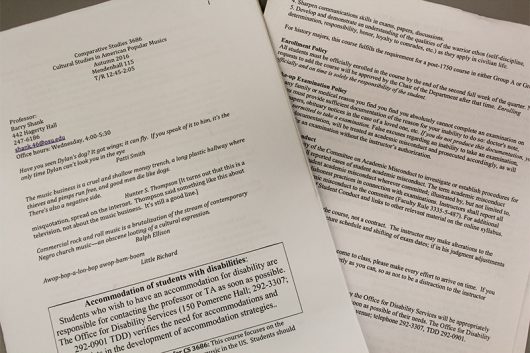
The Undergraduate Student Government is working to add a mental health statement on all syllabi. Credit: Mason Swires | Assistant Photo Editor
The third try could be the charm for an effort to get getting a mental-health statement published at the bottom of each Ohio State course syllabus.
Undergraduate Student Government has been working for more than two years to push Ohio State to include a statement on syllabi that lists the resource information for Office of Student Life’s Counseling and Consultation Services. However, each time the resolution has passed, it has expired at the end of the academic year, so it has never been implemented.
When resolutions expire at the end of each school year, USG must pass them again the next year to re-establish them, said Michael Frank, deputy director of health and safety for USG and a third-year in political science and economics.
Frank is also the USG senator who sponsored resolution 49-R-15, which passed earlier this year. However, Frank said he does not see the past expired resolutions as a letdown, but as a motivation to get this statement supported and used by faculty this year.
The statement on the syllabus would include the CCS address, phone number, website and location, similar to the message from the Office of Student Life Disability Services.
“The syllabus is your path to success in a class,” Frank said. “If you want to be able to succeed in it, you need to follow what’s in the syllabus and whether that’s test dates or resources are available for you, so why should mental health be treated any differently?”
The director of CCS, Dr. Micky Sharma, who helped write the statement, was involved in writing last year’s statement as well. It was drafted to be similar to the disability services’ message, because of its clarity, said Danielle Di Scala, vice president of USG and a fourth-year in political science.
“You recognize (the disability services statement) everywhere because it’s consistent, because it’s concise, because it effectively gets that information across,” she said. “Which is why it was so important that we collaborated with Dr. Sharma.”
USG hopes that putting CCS information on something that all students receive will increase the chances of someone in need seeing the information they can use for help.
“If this can save one student and make one or five or 10 students aware that we have these resources that they would have otherwise not seen … that’s why we do it,” Di Scala said. “If it can help anybody, why not?”
Sharma said that when more students and faculty become aware of mental health services, the awareness can help validate mental health diseases, and help students struggling see that they are not alone.
“If we include a statement on syllabi, what we’re doing is working to create a mental health-friendly environment,” Sharma said.
Dr. Natalie Lester, director of Psychiatric Emergency Services at the Wexner Medical Center, said midterms and exams are particularly stressful times when mental-health problems might be present, adding that these are also times when students will refer back to their course syllabi.
“A student with a mental-health concern may not think to look up contact information for the counseling center, and they may not even know that the university has a counseling center,” Lester said. “But if they see the contact information on their syllabi, where the information is readily accessible, that may prompt them to reach out and access help, putting them on the path to treatment and wellness.”
Frank said he was motivated to sponsor the legislation by his own struggles with mental health, which inspire him to help others who share similar issues.
He has mental-health issues with anxiety and eating, specifically making it difficult for him to eat when he is overly anxious. However, Frank no longer sees his disorders as an embarrassment.
“As I grew and got more comfortable with the situation … to be honest, I gave less of a shit,” Frank said. “I have mental-health problems, and it’s not an issue. And I am going to tell you: I don’t think it reflects poorly on me, like I used to.”


